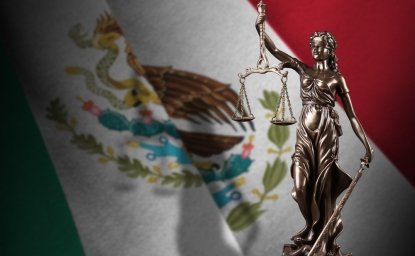In one of his first roles, actor Michael Douglas plays a young judge newly assigned to a criminal court. Frustrated by having to free a murderer due to legal technicalities, the young judge approaches his most experienced peers to secretly meet and discuss similar cases. If their verdict is guilty, a hitman is sent to kill the accused. Through this process, the judges took charge of bringing to justice those who deserved it, or at least that is what they thought until an innocent life was killed through their verdict.
I began to recall this movie ever since President López Obrador stated that "between justice and law, [he] opts for justice." Quite a disturbing turn of phrase, since there can certainly be law without justice, as in authoritarian regimes. But in a democracy, in a state of law, there can be no justice without law.
In his farewell as Minister of the Supreme Court, just under a year ago, José Ramón Cossío made an insightful reflection on democracy and constitutional justice. Here, I highlight some fragments:
“The crisis of democracy is disrupting the general image of constitutional justice and this seems very dangerous to me. Democracy, in the seizure of the all government bodies, is assuming that such bodies can do as they please because in the end, there is a legitimate and majority government. The function of constitutional justice is precisely to repress those attempts.”
Unlike in the past, where we thought about how to destroy political power, "the sign of our times is: how to use political power to diminish democracy."
Today, there are a myriad of books about the crisis of democracy, the death of democracy, and the pressures on the liberal system and its constitutional values.
Thus we have, more or less, diagnosed how democracy dies. “However, we must ask ourselves a different question: How does justice die? – general, day-to-day justice - and constitutional justice?”
“The ideological fluctuations of the present show us a democracy co-opted from even the most basic democratic means. There is no guarantee that the same will not happen with justice institutions.”
“It seems to me that we have not been able to fully explain that we, as judges, do not make justice. We do not have a metaphysical or religious capacity to know what justice is. What we do is carry out rationalized, organized, regulated processes that follow a legal order to give everyone what they deserve.”
"By doing the simple job of enforcing the Constitution, there is a possibility for constitutional justice to become a provider not only of rights, but of the legal order itself."
Perhaps the President is roused by a laudable desire to do justice for an oppressed people. The risk, however, is to end up without justice or law. And, this risk becomes particularly dangerous when a judge intends to do justice outside the law. When the judge becomes the vigilante.
This article was originally pubslished in Spanish in El Heraldo de México...
The opinions expressed here are solely those of the author.
Author


Mexico Institute
The Mexico Institute seeks to improve understanding, communication, and cooperation between Mexico and the United States by promoting original research, encouraging public discussion, and proposing policy options for enhancing the bilateral relationship. A binational Advisory Board, chaired by Luis Téllez and Earl Anthony Wayne, oversees the work of the Mexico Institute. Read more

Explore More
Browse Insights & Analysis
Assad's Reign Ends: Rebel Forces Overthrow Decades-Long Rule in Syria

Political Turmoil in Pakistan: No End in Sight


